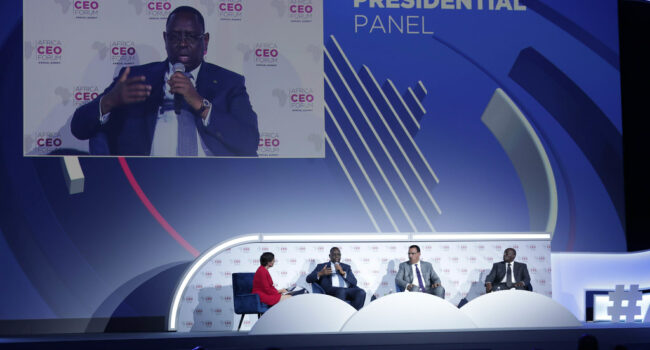Africa CEO Forum: How does prioritizing women’s health contribute to overall business success, and what steps can organizations take to integrate health support as a key element of their strategies?
Wendy Cupido: I truly believe that women are the engine that keep society going, a pillar of support for those around us. Women’s health – and the health of our communities, organisations, and economies – are so inextricably linked. We don’t simply have an important role to play in our workplace, but we often also have a role at home, too – as mothers, wives, daughters, and friends. With all these different roles to play, we tend to not make time for ourselves, and we actually do ourselves and those around us a disservice when we don’t prioritise our physical and mental health. As the inspiring Isabella Naana Asante, Founder of Embrace Society and Founder and CEO of Isabella Healthcare Services said during the 2023 Women Working for Change (WFC) Gender Champions meeting panel discussion, Wellbeing @ work: women’s health and business success, the most selfless thing that we, as women, can do is to take care of ourselves.
I believe that by empowering women to make healthcare decisions that are right for them, we help them succeed in the workplace and set an example for others to do the same by putting their own health first. For this to be possible, we need to help companies view health as a priority and make it an integral part of the business model. This means creating a safe space where employees can reflect or talk about health concerns or setting up support groups to share knowledge on healthcare and access to medicine. This starts with our leaders, as they need to set an example for others to break the stigma around discussing women’s health. As Ana Inés Álvarez, Executive Director of Avon Foundation for Women said during the panel discussion, we need to start recognising emotion as a strength, not a weakness.
Investing in employee wellbeing is so important for business success. Healthy employees are more productive, have higher job performance, and, most importantly, are happier. Investing in employee wellbeing also means lower healthcare costs for the business, and can even boost the reputation of the company by showing current and future employees that it is a supportive and caring workplace. Investing in healthcare isn’t just better for women – it’s good for business!
Africa CEO Forum: Roche has been actively involved in improving women’s health. Can you elaborate on Roche’s efforts to enhance the health of women in and out of the workplace and how these initiatives contribute to business success?
Wendy Cupido: I feel so proud to be doing my part in helping Roche achieve its commitment of improving women’s health by ensuring that as many women as possible can access the healthcare services they need, including improving screening, access, care, and treatment for cancer.
We’re working with stakeholders from all sectors – both public and private – including Ministries of Health, patient advocacy groups, and businesses across the continent. We cannot overcome challenges and do more for women worldwide by working in siloes. We also need to remember that health is an investment, not a cost. By continuing to invest in health – from educating to testing and access – we can reimagine women’s healthcare in Africa. It’s a win-win situation: when we support women’s health, we support their careers too.
Over the next five years, Roche will work to improve the entire patient journey, from diagnosis to treatment across Africa, including Morocco, Algeria, Kenya, Nigeria, South Africa, and beyond. By taking a holistic approach and integrating non-communicable diseases into Universal Health Coverage (UHC), we can make sure women can access the care they need whilst contributing to business success.
Africa CEO Forum: While programs are in place, barriers may still exist. What social and cultural changes do you believe are necessary to empower women to confidently access health support systems in the workplace?
Wendy Cupido: Barriers exist for women’s health on so many levels, whether it’s access to resources or having support systems in place to get medical help. We can only start to break down these barriers by working together to improve access to healthcare for all women. Women’s health is not just a woman’s issue – it’s a societal issue, and we all need to work together to make progress. This means involving men in conversations, encouraging them to raise awareness amongst their peers, educating, and calling out those that are perpetuating the cycle if needed.
Women’s pain tends to be dismissed, and symptoms are not taken seriously. I’ve experienced this myself in the workplace, where women’s health is often stigmatised. This means women – and men – don’t talk about women’s health enough. This prevents us from getting the help we need and stops us from thriving in the workplace.
On top of this, women face societal expectations of being caretakers – of their homes, partners, parents, and children – and juggle multiple hats and responsibilities simultaneously. We’ve made so much progress over the last few years, but there’s still much more to be done!
Africa CEO Forum: Reflecting on Roche’s experiences, what are the biggest challenges Roche’s face when trying to implement change in the context of women’s health? How can these challenges be overcome to ensure effective support for women in the workplace?
Wendy Cupido: One of the biggest challenges we’re facing is inequality. Breast cancer is the most common cancer worldwide, but the fight against it is far from equal. Only 4 in 10 women diagnosed with breast cancer in sub-Saharan Africa survive beyond five years – in Western Europe and North America the survival rate is 9 in 10. This inequality all comes down to lack of awareness, late diagnosis, insufficient treatment facilities, and failure to include breast cancer in UHC.
Along with fighting to change women’s health, we also have to work to change society’s perspective. As I said before, women’s health is not just a woman’s issue, it’s a societal one. We have a shared responsibility to overcome healthcare challenges now and, in the future, and we can’t do this without working together. By improving healthcare worldwide, we can foster an environment where women are empowered to make decisions and are supported in the workplace, and I’m so humbled to be able to do my part in this through my work at Roche.
Watch the day one of the Gender Champions Meeting:
Watch the day two of the Gender Champions Meeting:



